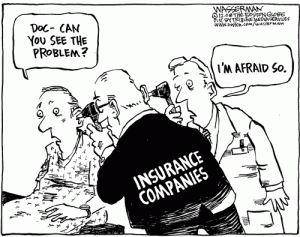
November 21st, 2012 by Dr. Val Jones in Health Policy, Opinion
Tags: Accountability, bureaucracy, Caremark, Health Insurance, P4P, Patients, Pay For Performance, Prescription Benefit Manager
No Comments »
 In a recent post entitled, “The Joys Of Health Insurance Bureaucracy” I described how it took me (a physician) over three months to get one common prescription filled through my new health insurance plan. Of note, I have still been unable to enroll in the prescription refill mail order service that saves my insurer money and (ostensibly) enhances my convenience. The prescription benefits manager (PBM) has lost three of my physician’s prescriptions sent to them by fax, and as a next step have emailed me instructions to complete an online form so that they have permission to contact my physician directly (to confirm the year’s refills). Unfortunately, page one of the form requires you to fill in your drug name and match it to their database’s list before you can continue to page two. For reasons I can’t understand, my common drug is not in their database. Therefore, I am unable to comply with my insurer’s wish that I enroll in mail order prescription refills. This will further delay receipt of my medication – and probably increase my cost as I will be penalized for not opting into the “preferred” mail order refill process.
In a recent post entitled, “The Joys Of Health Insurance Bureaucracy” I described how it took me (a physician) over three months to get one common prescription filled through my new health insurance plan. Of note, I have still been unable to enroll in the prescription refill mail order service that saves my insurer money and (ostensibly) enhances my convenience. The prescription benefits manager (PBM) has lost three of my physician’s prescriptions sent to them by fax, and as a next step have emailed me instructions to complete an online form so that they have permission to contact my physician directly (to confirm the year’s refills). Unfortunately, page one of the form requires you to fill in your drug name and match it to their database’s list before you can continue to page two. For reasons I can’t understand, my common drug is not in their database. Therefore, I am unable to comply with my insurer’s wish that I enroll in mail order prescription refills. This will further delay receipt of my medication – and probably increase my cost as I will be penalized for not opting into the “preferred” mail order refill process.
Now, all of this is infuriating enough on its own, but the larger concern that I have is this: How many patients are not “compliant” with their medication regimen because of problems/delays with their health insurer or PBM? Physicians are being held accountable for their patients’ medication compliance rates, even receiving lower compensation for patients who don’t reach certain goals. This is called “pay-for-performance” and it’s meant to incentivize physicians to be more aggressive with patient follow up so that people stay healthier. But all the follow up in the world isn’t going to get patient X to take their medicine each day if their health insurer or PBM makes it impossible for them to get it in the first place. And shouldn’t there be consequences for such excessive red tape? Who is holding the insurers and PBMs accountable for their inefficiencies that prevent patients from getting their medicines in a timely manner?
Pay-for-performance assumes that physicians are the only healthcare influencers in the patient compliance cycle. I’ve learned that we only play a part in helping people stay on the best path for their health. Other key players can derail our best intentions, and it’s high time that we look at the poor performance of health insurers and PBMs as they often block (with intentional bureaucracy) our patients from getting the medicine they need. While insurers save money by having patients struggle to get their prescriptions filled, doctors are payed less when patients don’t take their medicines.
Not a great time to be a doctor or a patient… or both.
November 9th, 2012 by Dr. Val Jones in Health Policy, Humor, Opinion
Tags: Assimilation, Concierge Medicine, DocTalker Family Medicine, Doug Farrago, Economies Of Scale, Health Insurance, Healthcare Costs, Hospitalists, Large Group Practice, Primary Care, Private Practice, Solo Practice, Star Trek, The Borg
4 Comments »
 If you live in a small town or rural area of the United States, you may have noticed that family doctors are becoming an endangered species. Private and public health insurance reimbursement rates are so low that survival as a solo practitioner (without the economies of scale of a large group practice or hospital system) is next to impossible. Some primary care physicians are staying afloat by refusing to accept insurance – this allows them the freedom to practice medicine that is in the patient’s best interest, rather than tied to reimbursement requirements.
If you live in a small town or rural area of the United States, you may have noticed that family doctors are becoming an endangered species. Private and public health insurance reimbursement rates are so low that survival as a solo practitioner (without the economies of scale of a large group practice or hospital system) is next to impossible. Some primary care physicians are staying afloat by refusing to accept insurance – this allows them the freedom to practice medicine that is in the patient’s best interest, rather than tied to reimbursement requirements.
I joined such a practice a few years ago. We make house calls, answer our own phones, solve at least a third of our patients’ problems via phone (we don’t have to make our patients come into the office so that we can bill their insurer for the work we do), and have low overhead because we don’t need to hire a coding and billing team to get our invoices paid. Our patients love the convenience of same day office visits, electronic prescription refills, and us coming to their house or place of business as needed.
Using health insurance to pay for primary care is like buying car insurance for your windshield wipers. The bureaucracy involved raises costs to a ridiculously unreasonable level. I wish that more Americans would decide to pay cash for primary care and buy a high deductible health plan to cover catastrophic events. But until they do, economic pressures will force primary care physicians into hospital systems and large group practices. My friend and fellow blogger Dr. Doug Farrago likens this process to being “assimilated by the Borg.”
Doug offered a challenge to his readers – to customize the definition of Star Trek’s Borg species to today’s healthcare players. I gave it my best shot. Do you have a better version?
Who are the Borg:
The Borg are a collection of alien species that have turned into cybernetic organisms functioning as drones of the collective or the hive. A pseudo-race, dwelling in the Star Trek universe, the Borg take other species by force into the collective and connect them to “the hive mind”; the act is called assimilation and entails violence, abductions, and injections of cybernetic implants. The Borg’s ultimate goal is “achieving perfection”.
My attempt to customize the definition:
Hospitalists are a collection of primary care physicians that have turned into cybernetic organisms functioning as drones of the collective or hive. Hive collective administrators (HCAs), in association with partnered alien species drawn from the insurance industry and government, take other primary care physicians by economic force and connect them to “the hive mind”; the act is called assimilation and entails crippling reimbursement cuts, massive increases in documentation requirements, oppressive professional liability insurance rates, punitive bureaucratic legislation, and threat of imprisonment for failure to adhere to laws that HCA- partnered species interpret however they wish. The HCAs’ ultimate goal is “achieving perfect dependency” first for the drones, then for their patients, so that HCAs and their alien partners will become all powerful – dictating how neighboring species live, breathe, and conduct their affairs. Resistance is futile.
***
To learn more about my insurance-free medical practice, please click here. We can unplug you from the Borg ship!
November 1st, 2012 by Dr. Val Jones in Health Policy, Opinion
Tags: Beauty, Beauty At Any Size, Costs, Employer Incentives, Health Concerns, Obesity, Overweight, Public Health, smoking, Wellness
3 Comments »
 It is estimated that 44% of Americans will be obese by the year 2030. The AMA warns that increasing obesity rates will lead “to millions of additional cases of type 2 diabetes, stroke and coronary heart disease, as well as arthritis and hypertension. Billions of dollars will be wasted through lost economic productivity and skyrocketing medical costs.”
It is estimated that 44% of Americans will be obese by the year 2030. The AMA warns that increasing obesity rates will lead “to millions of additional cases of type 2 diabetes, stroke and coronary heart disease, as well as arthritis and hypertension. Billions of dollars will be wasted through lost economic productivity and skyrocketing medical costs.”
And yet, a funny thing is happening in consumer land – efforts to normalize obesity are gaining momentum via social media platforms. Take the “beauty comes in all sizes” ad for example. This was shared with me by an old grade school friend on Facebook. And while I can appreciate the sentiment that women of various genetic predispositions are beautiful, I stopped short at the idea that obesity itself was attractive. There is a growing movement among obese men and women to promote acceptance of their size, and if they win this argument they could substantially undermine efforts to help Americans become healthy and avoid disease. I know this sounds harsh, but to me, promoting beauty of all sizes – when that includes obesity- is tantamount to promoting a “smoking is cool” campaign.
Smoking rates in the United States have dropped from 42.4% in 1965 to 19% in 2010. Although one-in-five people still smoke, we have successfully reduced the smoking burden by more than half. The reasons for this reduction are complex, but they include public awareness campaigns regarding the harmfulness of cigarette smoking, increasing taxes on cigarettes, and public policy regarding where and when people can smoke in public.
The same exact approach can’t work for obesity because while people can simply quit smoking, we can’t quit eating. And what we eat is less important than how much we eat. I personally do not favor “fat taxes” on specific food items because almost any food could cause weight gain if consumed in large enough quantities. I also don’t favor singling out obese people for portion reduction at restaurants (this has actually been proposed), or other policies that are similar to what we’ve done with smoking in public spaces. Promoting prejudice against the obese is not constructive.
So that leaves us with public perception/education and peer pressure as our primary national strategy for reducing obesity rates. (Of course smaller initiatives can help: employers can incentivize weight loss and wellness, policy makers can encourage new housing developments that promote active lifestyles, and local groups and non-profits can promote fitness initiatives and healthy eating behaviors.)
My concern is that if too many people decide that normalizing obesity is better than fighting it, America will lose this battle. Obesity-related disease is already costing us about twice as much as smoking-related illnesses. And both smoking and obesity are nearly 100% avoidable.
Obesity is not beautiful, and we must redouble our efforts to win the hearts and minds of the public on this subject without resorting to the other extreme (idolizing anorexia). Good health lies somewhere in the middle – and keeping our middles within a reasonable range is the most important health goal we have.
October 25th, 2012 by admin in Opinion
Tags: Children, Chronic Illness, Coping With Illness, Parenting, Psychiatry, Psychotherapy
1 Comment »

Photograph: Roger Bamber
How far do we travel from our parents’ patterns? A question psychotherapists and their clients have been wrestling with for decades.
We can’t escape the parental imprint. Some of us may not want to. But those of us who did hope to be different often find ourselves in our 40s or 50s unexpectedly leaking parental behaviors or attitudes we thought we had purged ourselves of in our 20s.
I sometimes hear myself saying to Richard, my partner, as he heads out the door for his Tae Kwon Do class, “Be careful.” He has a second degree black belt and has been studying for years. He is always careful. My admonition is a spillover of my father’s anxious voice warning me to be on the lookout for endless, unnamed dangers hiding in plain sight at every turn. Other times I see myself tighten up like a fist when something I thought I had control over twists in an unpredictable direction. It is not my jaw that clenches in agitation; it is my mother’s jaw, on my face.
How our parents do or did illness is a powerful pattern. Did they suffer in silence, while allowing no one to offer tenderness or help? Did they submerge into illness and allow it to define who they were? Did they use illness to control and manipulate? To get attention? Did they remain engaged in living and loving? Did they learn from illness to become more fully who they were? Did they become nastier to each other? Or sweeter? And finally, did they take care of each other — physically and emotionally?
My parents, who kept each other at a distance when well, became even more separated when ill. They went so far as to resent each other for their increasing incapacities. It was not pretty.
There were times when I was in the thick of my pain condition, that I isolated and withdrew from Richard. But more often, I allowed my pain to teach me to reach out for comfort and connection. I had to. For me, the voice of pain was more powerful than my parents’ example.
Dealing with illness can be a consuming job. When you find yourself behaving in ways that don’t create the kind of bridge to your partner that will help lighten the load for both of you, pause and ask yourself: “Am I playing out a pattern that doesn’t really belong to me? Whose voice am I speaking with? Can I do it differently?”
How did your parents deal with illness? What did you learn to do and not to do from them?
***
Barbara Kivowitz is a psychotherapist, business consultant, and book author. She blogs regularly at In Sickness And In Health.
September 23rd, 2012 by Dr. Val Jones in Health Policy, Opinion
Tags: AHRQ, Big Brother, Federal Goverment, Medical Errors, Obama, Obamacare, Patients, Patients Reporting Physicians, Snitch
2 Comments »
 In another example of government over-reach, the NYT describes how the Obama administration is enlisting the help of patients to report physicians (whom they believe may have made a medical error), directly to the federal government. While there are systems already in place for such reports at the local hospital level, apparently the “under reporting of medical errors” has triggered AHRQ to pilot a program in which questionnaires are sent to patients to ferret out potential examples of errors caused by the following:
In another example of government over-reach, the NYT describes how the Obama administration is enlisting the help of patients to report physicians (whom they believe may have made a medical error), directly to the federal government. While there are systems already in place for such reports at the local hospital level, apparently the “under reporting of medical errors” has triggered AHRQ to pilot a program in which questionnaires are sent to patients to ferret out potential examples of errors caused by the following:
* “A doctor, nurse or other health care provider did not communicate well with the patient or the patient’s family.”
* “A health care provider didn’t respect the patient’s race, language or culture.”
* “A health care provider didn’t seem to care about the patient.”
* “A health care provider was too busy.”
* “A health care provider didn’t spend enough time with the patient.”
* “Health care providers failed to work together.”
* “Health care providers were not aware of care received someplace else.”
So if a patient determines, for example, that a physician did not spend enough time with them, and they believe that resulted in a medical error (whatever that might be), they can/should report the physician to the federal government. Wow. One physician explains the potential hazards of such a process:
Dr. Kevin J. Bozic, the chairman of the Council on Research and Quality at the American Academy of Orthopaedic Surgeons, said it was important to match the patients’ reports with information in medical records.
“Patients’ perceptions and experience of care are very important in assessing the overall success of medical treatments,” Dr. Bozic said. “However, patients may mischaracterize an outcome as an adverse event or complication because they lack specific medical knowledge.
“For instance, a patient may say, ‘I had an infection after surgery’ because the wound was red. But most red wounds are not infected. Or a patient says, ‘My hip dislocated’ because it made a popping sound. But that’s a normal sensation after hip replacement surgery.”
I believe that reporting medical errors is critical in the process of quality improvement, but that is most efficiently handled at the hospital level. There is no need to involve the federal government at the earliest stages of investigation, and the amount of bureaucracy required to support such an effort boggles the mind.
In the past when I encountered medical errors in the hospital setting, I found successful ways to report the incidents to the local administration. The result was a rapid correction of the problems and new processes put in place to ensure that it didn’t happen again. This is how medical errors should be reported and resolved. Soliciting patients for accounts of subtle lapses in social graces by their healthcare providers, and then reporting them to the government for it, is nothing short of Big-Brother creepy.
 In a recent post entitled, “The Joys Of Health Insurance Bureaucracy” I described how it took me (a physician) over three months to get one common prescription filled through my new health insurance plan. Of note, I have still been unable to enroll in the prescription refill mail order service that saves my insurer money and (ostensibly) enhances my convenience. The prescription benefits manager (PBM) has lost three of my physician’s prescriptions sent to them by fax, and as a next step have emailed me instructions to complete an online form so that they have permission to contact my physician directly (to confirm the year’s refills). Unfortunately, page one of the form requires you to fill in your drug name and match it to their database’s list before you can continue to page two. For reasons I can’t understand, my common drug is not in their database. Therefore, I am unable to comply with my insurer’s wish that I enroll in mail order prescription refills. This will further delay receipt of my medication – and probably increase my cost as I will be penalized for not opting into the “preferred” mail order refill process.
In a recent post entitled, “The Joys Of Health Insurance Bureaucracy” I described how it took me (a physician) over three months to get one common prescription filled through my new health insurance plan. Of note, I have still been unable to enroll in the prescription refill mail order service that saves my insurer money and (ostensibly) enhances my convenience. The prescription benefits manager (PBM) has lost three of my physician’s prescriptions sent to them by fax, and as a next step have emailed me instructions to complete an online form so that they have permission to contact my physician directly (to confirm the year’s refills). Unfortunately, page one of the form requires you to fill in your drug name and match it to their database’s list before you can continue to page two. For reasons I can’t understand, my common drug is not in their database. Therefore, I am unable to comply with my insurer’s wish that I enroll in mail order prescription refills. This will further delay receipt of my medication – and probably increase my cost as I will be penalized for not opting into the “preferred” mail order refill process.


 If you live in a small town or rural area of the United States, you may have noticed that family doctors are becoming an endangered species. Private and public health insurance reimbursement rates are so low that survival as a solo practitioner (without the economies of scale of a large group practice or hospital system) is next to impossible. Some primary care physicians are staying afloat by refusing to accept insurance – this allows them the freedom to practice medicine that is in the patient’s best interest, rather than tied to reimbursement requirements.
If you live in a small town or rural area of the United States, you may have noticed that family doctors are becoming an endangered species. Private and public health insurance reimbursement rates are so low that survival as a solo practitioner (without the economies of scale of a large group practice or hospital system) is next to impossible. Some primary care physicians are staying afloat by refusing to accept insurance – this allows them the freedom to practice medicine that is in the patient’s best interest, rather than tied to reimbursement requirements. It is
It is
 In another example of government over-reach, the
In another example of government over-reach, the 







